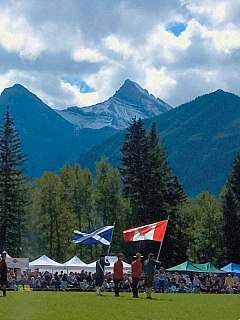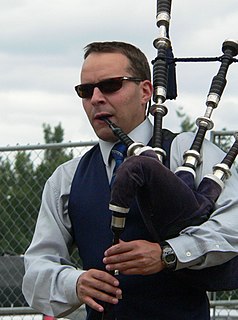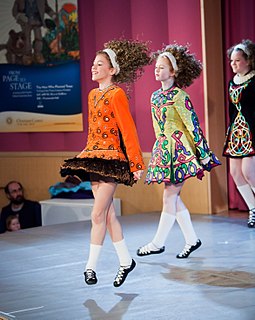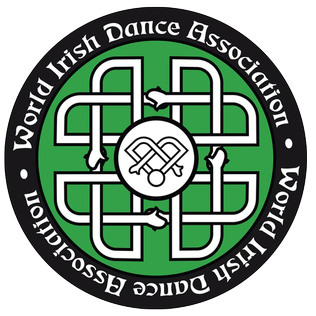
Irish dance or Irish dancing is a group of traditional dance forms originating from Ireland, encompassing dancing both solo and in groups, and dancing for social, competitive, and performance purposes. Irish dance in its current form developed from various influences such as French quadrilles and English country dancing throughout the 18th and 19th centuries. Dance was taught by "travelling dance masters" across Ireland throughout this period, and separate dance forms developed according to regional practice and differing purposes. Irish dance became a significant part of Irish culture, particularly for Irish nationalist movements. From the early 20th century, a number of organisations promoted and codified the various forms of dance, creating competitive structures and standardised styles.

A pipe band is a musical ensemble consisting of pipers and drummers. The term used by military pipe bands, pipes and drums, is also common.

A cèilidh or céilí is a traditional Scottish or Irish social gathering. In its most basic form, it simply means a social visit. In contemporary usage, it usually involves dancing and playing Gaelic folk music, either at a house party or a larger concert at a social hall or other community gathering place.

Highland games are events held in spring and summer in Scotland, United Kingdom, and other countries with a large Scottish diaspora, as a way of celebrating Scottish and Celtic culture, especially that of the Scottish Highlands. Certain aspects of the games are so well known as to have become emblematic of Scotland, such as the bagpipes, the kilt, and the heavy events, especially the caber toss. While centred on competitions in piping and drumming, dancing, and Scottish heavy athletics, the games also include entertainment and exhibits related to other aspects of Scottish and Gaelic culture.
A strathspey is a type of dance tune in 4
4 time. It is, simply stated, a reel played at a slightly slower tempo, with slightly more emphasis on certain beats. This emphasis can be the same measure to measure or vary throughout the tune, depending on the player. Cut-dot snap rhythms, or "Scotch snaps", are a feature of both. These are short notes before a dotted notes, which in traditional playing is generally exaggerated rhythmically for musical expression. An example of a strathspey would be the song "The Bonnie Banks o' Loch Lomond", provided it is sung staccato:
Celtic music is primarily associated with the folk traditions of Ireland, Scotland, Brittany and Wales, as well as the popular styles derived from folk culture. In addition, a number of other areas of the world are known for the use of Celtic musical styles and techniques, including Newfoundland, and much of the folk music of Canada's Maritimes, especially on Cape Breton Island and Prince Edward Island.
The Highland Fling is a solo Highland dance that gained popularity in the early 19th century. The word 'Fling' means literally a movement in dancing. In John Jamieson's Etymological Dictionary of the Scottish Language, 1808, the Highland Fling was defined as 'one species of movement' in dancing, not as one particular movement. There is some speculation that the first solo Highland Fling dances simply showed off steps that individual dancers preferred in the Strathspey Reel, a social dance.
A dirk dance is a Scottish dance performed while brandishing a dirk. It is a solo dance but can be performed by two or more people dancing in unison. The dance is quite different in style from the better known Highland dances and in many ways imitates the use of a dirk in fighting. Research suggests that the dance may, in fact, have originated as a series of moves for training in the use of the dirk. There are records showing that a Dirk Dance was included in Highland Dance competitions in 1841.
A Feis or Fèis is a traditional Gaelic arts and culture festival. The plural forms are feiseanna and fèisean. The term "feis" is commonly used referring to Irish dance competitions and, in Scotland, to immersive teaching courses, specialising in traditional music and culture. In Scottish Gaelic, the accent is important because there is a difference of meaning and pronunciation between 'feis' and 'fèis' - the word 'feis' means sexual intercourse,.

Jori Lance Chisholm is an American professional bagpipe player and teacher who lives in Seattle, Washington. Chisholm is a successful solo competitor winning the United States Gold Medal four times and has placed in the top three in Scotland's Argyllshire Gathering Gold Medal competition. He played with the six-time Grade One World Champion Simon Fraser University Pipe Band and was a featured solo performer for the band on multiple occasions. Chisholm has performed in front of sold-out audiences with The Chieftains and with ex-Grateful Dead rocker Bob Weir and his band Ratdog, and has been featured as a soloist or band member on over 20 recordings. His debut solo album Bagpipe Revolution was nominated for Album of the Year by Pipes|Drums magazine. He writes the "Sound Technique" column for the National Piping Centre’s bi-monthly Piping Today Magazine. The New York Times featured Chisholm's online teaching program, BagpipeLessons.com, and described him as a "top-tier teacher" in a front-page story about the growth of Skype music lessons. A cover story in American Profile Magazine named Chisholm one of the "world's elite pipers."

Irish stepdance is a style of performance dance with its roots in traditional Irish dance. It is generally characterized by a stiff upper body and quick and precise movements of the feet. It can be performed solo or in groups. Aside from public dance performances, there are also stepdance competitions all over the world. These competitions are often called Feiseanna. In Irish dance culture, a Feis is a traditional Gaelic arts and culture festival. Costumes are considered important for stage presence in competition and performance Irish stepdance. In many cases, costumes are sold at high prices and can even be custom made. Males and females can both perform Irish stepdance but for the most part in today's society, the dance remains predominantly female. This means that the costumes are mainly dresses. Each dress is different, with varying colors and patterns, designed to attract the judge's eye in competitions and the audience's eye in performance. General appearance besides the costume is also equally important. Dancers would typically curl their hair before each competition. Many dancers invest in curled wigs that match their hair color. Poodle Socks are worn with the dresses and shoes. These are white socks that stretch to mid calf with distinctive ribbing.

The World Irish Dance Association (WIDA) is an Irish stepdance organisation founded in 2004. It is based primarily in Europe and the United Kingdom, and offers "open platform" competitions that are open to competitors from all Irish dance organisations.

The Cowal Highland Gathering is an annual Highland games held in the Scottish town of Dunoon, on the Cowal peninsula in Argyll and Bute, over the final weekend in August.
The Seann Triubhas is a Highland Dance. Its name is a Gaelic phrase which means "Old Trousers".It is called this because the Scottish wanted a way of celebrating getting their Scottish culture back from the British
Victor Wesley is a Scottish-born American dancer. He is a three-time Highland Dance World Champion, winning at the Cowal Highland Gathering in Dunoon, Scotland, in 1968, 1969, and 1972.
Hugh Alexander “Sandy” MacIntyre is one of the most respected artists in the tradition of Cape Breton fiddle music.
Barbara Kinghorn is a British actress who was a member of the Royal Shakespeare company from 1980 to 1983 playing Lady Capulet in Romeo and Juliet and Helen of Troy in Troilus and Cressida. She also played Timmin in the Doctor Who episode The Caves of Androzani. She appeared in Sorry! and Chance in a Million. Her West End appearances included "Fringe Benefits" at the Whitehall Theatre and "Good" at the Aldwych. Barbara married Johannesburg theatre producer/actor Louis Ife.

Comhdháil na Múinteoirí le Rincí Gaelacha, also referred to as An Chomhdháil, is a global governing body for Irish stepdance. Founded in the early 1960s, and then breaking from An Coimisiún Le Rincí Gaelacha to become an independent organisation, An Chomhdháil is today the second-largest Irish dance organisation and one of six to run a World Championships competition.

Oireachtas Rince na Cruinne is an annual Irish stepdance competition run by An Coimisiún Le Rincí Gaelacha. The Worlds include competitions for solo stepdance, organised by gender and age; and for certain traditional and original ceili dances, also divided by age group and team gender composition. Oireachtas Rince na Cruinne is the top competition of the hierarchical system operated by An Coimisiún, and dancers must qualify at major Irish stepdance events across the world in order to compete.












